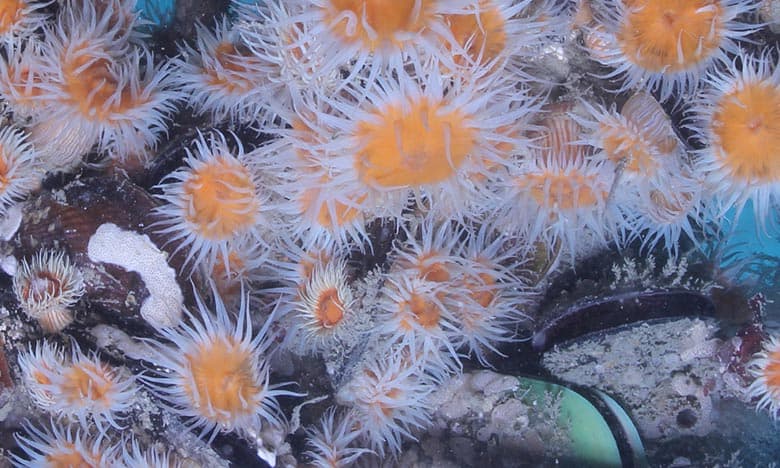Marine Biosecurity
Protecting our marine environment and resources from pests and diseases.

Marine Biosecurity
Protecting our marine environment and resources from pests and diseases.
Innovative and robust science is required to understand the biosecurity risks facing New Zealand and develop robust prevention, protection and management strategies. Cawthron’s biosecurity team provides expertise and consulting services for all marine and freshwater biosecurity threats. This includes managing non-indigenous pests and diseases, and assisting with biosecurity regulatory compliance and risk mitigation. We work closely with our clients to provide applied research and services designed to meet their specific needs.
Aquaculture Biosecurity
Cawthron’s marine biosecurity team has a close relationship with the aquaculture industry to guard against marine pest and disease issues. Our services and capabilities for aquaculture clients include:
- research into the biology and management of aquatic viruses
- assistance in understanding
- preventing and managing biofouling on mussel and salmon farms
- the development of tools and technologies to manage pests
- the development of tools to manage risk pathways, and
- the assessment of existing and emerging pest and disease threats to New Zealand’s aquaculture industry.
Management Plans and Inspections
Cawthron’s marine biosecurity team are highly qualified and experienced in developing vessel and oil rig biosecurity management plans to meet New Zealand and Australian border requirements. We also undertake biofouling inspections for rigs and associated vessels travelling into New Zealand and Australian waters. Our established relationships with regulators, knowledge of biosecurity issues associated with vessels and oil rigs and familiarity with the oil and gas industry and its infrastructure make us well-placed to provide expert advice. We have substantive experience investigating mitigation options for biofouling and ballast water risks, a proven track record in undertaking dive inspections to meet strict border entry requirements and partner across a network of commercial dive companies to assist with inspections.
Molecular Tools
Cawthron is developing molecular-based tools that allow the early detection of invasive organisms and other pests and diseases in our marine and freshwater ecosystems. The DNA-based assays support research and commercial monitoring programmes targeting marine and freshwater algae, cyanobacteria, and bioinvasive/pest species that pose a risk to the safety of seafood exports, water quality, aquaculture production and biodiversity.
Vector Risks
Vessel biofouling remains the greatest source of new marine species introductions to New Zealand, accounting for around 70 percent of documented marine biosecurity incursions. Our scientists have extensive expertise in vessel biofouling and are developing new technologies to improve detection of pest threats. Current projects include: the use of cutting-edge molecular tools to characterise microscopic biofouling communities on vessel hulls, PhD research into the effect of port residency period and subsequent voyage pattern on growth and reproduction of biofouling organisms and the development of biosecurity management plans for oil rigs and associated vessels entering New Zealand waters.
Pest Biology and Impacts
Cawthron’s extensive knowledge of the biology and impacts of pest and disease organisms helps to ensure that informed decisions are made on the costs and benefits of management. Cawthron is home to biosecure laboratories and aquaria facilities that support this research, alongside expert technical staff who are familiar with spawning and rearing techniques for most groups of marine taxa. Our people are experts in taxonomy, biology, ecology, chemistry, biochemistry, molecular biology, microbiology and pathology. We also offer world-leading expertise in plant-based pests such as marine and freshwater algae and didymo.
Pest Management
Cawthron Institute has led the way in the development of tests, tools and treatment methods to manage marine pest incursions.
Simple tools:
- Plastic encapsulation of marine structures (e.g. marina pontoons, vessels) that have been colonised by pests
- Hull cleaning devices that retain biofouling once removed from a vessel
- Heat treatment of organisms that occur in vessel sea chests
- Spraying/immersion of mussel seed stock in fresh water and using eco-friendly chemicals
- Spraying/immersion of fishing, diving and other recreational equipment with household detergents to prevent incursions into Fiordland
- BioBullets (fat-coated capsules containing salt-based toxins) developed in collaboration with Dr David Aldridge from the University of Cambridge
Advanced technologies:
- Development and testing of natural anti-fouling compounds
- Super-hydrophobic plasma-polymerised coatings to prevent biofouling
- Elicitor compounds to turn on natural anti-fouling defences in cultured mussels
- The use of indigenous organisms for biological control